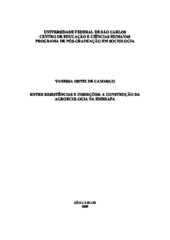| dc.contributor.author | Camargo, Vanessa Ortiz de | |
| dc.date.accessioned | 2016-06-02T20:39:11Z | |
| dc.date.available | 2009-12-02 | |
| dc.date.available | 2016-06-02T20:39:11Z | |
| dc.date.issued | 2009-08-28 | |
| dc.identifier.citation | CAMARGO, Vanessa Ortiz de. Entre resistências e inserções : a construção da agroecologia na Embrapa. 2009. 103 f. Dissertação (Mestrado em Ciências Humanas) - Universidade Federal de São Carlos, São Carlos, 2009. | por |
| dc.identifier.uri | https://repositorio.ufscar.br/handle/ufscar/6707 | |
| dc.description.abstract | The goal of this dissertation is to investigate as agroecology, alternative approach to agriculture characterized by socio-environmental concerns, becomes a prospect that internalises in public institutions of research devoted to agriculture. Analyzing the case of Empresa Brasileira de Pesquisa Agropecuaria (Embrapa), which was historically linked to agricultural modernization in Brazil, the research aims to investigate what the conditions of insertion of the agroecology theme is how the process of legitimation of this. The research consisted of a case study on the institutional process of legitimization of agroecology in EMBRAPA. First, we analyze the official discourse of the company, the institutional position, defined in documents published on the subject. A second step of analysis aims to evaluate how this process is reflected in the level of daily practices of agents. For this, interviews were conducted with experts and researchers from Embrapa Meio Ambiente, located in Jaguariúna- SP. Understanding the Embrapa Meio Ambiente as a field of provisions in dispute, where the agents compete for the accumulation of specific, we show that the environmental issue, and particularly the discussion agroecology, introduce new elements and provide conflicting dynamics. The agroecological perspective takes a marginal seat, or dominated the field in relation to conventional farming, and thus the defenders of agroecology looking agents make use of various strategies, seeking state their views and their understanding of science. If on the one hand social movements seeking intervention in the company entering new perspectives on the other hand, the institution makes use of a series of devices to accommodate new practices to their routines. | eng |
| dc.description.sponsorship | Financiadora de Estudos e Projetos | |
| dc.format | application/pdf | por |
| dc.language | por | por |
| dc.publisher | Universidade Federal de São Carlos | por |
| dc.rights | Acesso Aberto | por |
| dc.subject | Sociologia do conhecimento | por |
| dc.subject | Pesquisa agropecuária | por |
| dc.subject | Agricultura e meio ambiente | por |
| dc.subject | Embrapa | por |
| dc.subject | Agroecologia | por |
| dc.subject | Agricultural research | eng |
| dc.subject | Sustainable agriculture | eng |
| dc.subject | Agroecology | eng |
| dc.subject | Sociology of science | eng |
| dc.title | Entre resistências e inserções: a construção da Agroecologia na Embrapa | por |
| dc.type | Dissertação | por |
| dc.contributor.advisor1 | Andrade, Thales Haddad Novaes de | |
| dc.contributor.advisor1Lattes | http://lattes.cnpq.br/5882842888759363 | por |
| dc.description.resumo | O objetivo desta dissertação consiste em investigar como a agroecologia, abordagem alternativa de agricultura caracterizada por preocupações sócio-ambientais, passa a ser uma perspectiva que se internaliza em instituições públicas de pesquisa voltadas ao setor agropecuário. Analisando o caso da Empresa Brasileira de Pesquisa Agropecuária (Embrapa), que historicamente esteve vinculada à modernização agrícola no Brasil, a pesquisa pretende investigar quais as condições da inserção da temática da agroecologia e como se dá o processo de legitimação desta perspectiva. A pesquisa consistiu em um estudo de caso sobre o processo de legitimação institucional da agroecologia na EMBRAPA. Num primeiro momento, analisamos o discurso oficial da empresa, a posição institucional, definida nos documentos publicados, relativa ao tema. Um segundo passo da análise buscou verificar como esse processo se traduz no nível das práticas cotidianas dos agentes. Para tanto, foram realizadas entrevistas com técnicos e pesquisadores da unidade descentralizada Embrapa Meio Ambiente, localizada em Jaguariúna-SP. Entendendo a Embrapa Meio Ambiente como um campo de disposições em disputa, onde os agentes concorrem para a acumulação de capital específico, mostramos que a temática ambiental e, em especial, o debate agroecológico, introduzem elementos novos e estabelecem dinâmicas conflitivas. A perspectiva agroecológica toma um lugar marginal, ou dominado no campo, em relação à agricultura convencional e, assim, os agentes defensores da agroecologia procuram lançar mão de diversas estratégias, buscando afirmar seu ponto de vista e seu entendimento de ciência. Se por um lado os movimentos sociais buscam intervir na empresa inserindo novas perspectivas, por outro, a instituição lança mão de uma série de dispositivos para acomodar novas práticas às suas rotinas. | por |
| dc.publisher.country | BR | por |
| dc.publisher.initials | UFSCar | por |
| dc.publisher.program | Programa de Pós-Graduação em Sociologia - PPGS | por |
| dc.subject.cnpq | CIENCIAS HUMANAS::SOCIOLOGIA | por |
| dc.contributor.authorlattes | http://lattes.cnpq.br/8990001145592504 | por |
